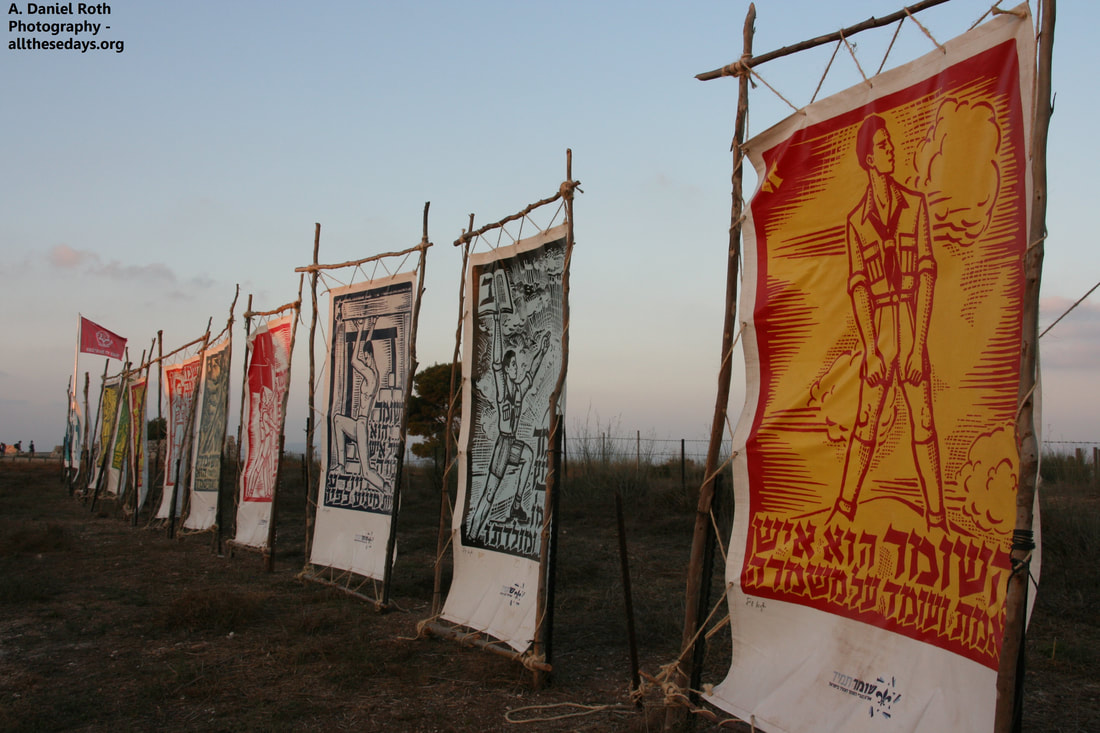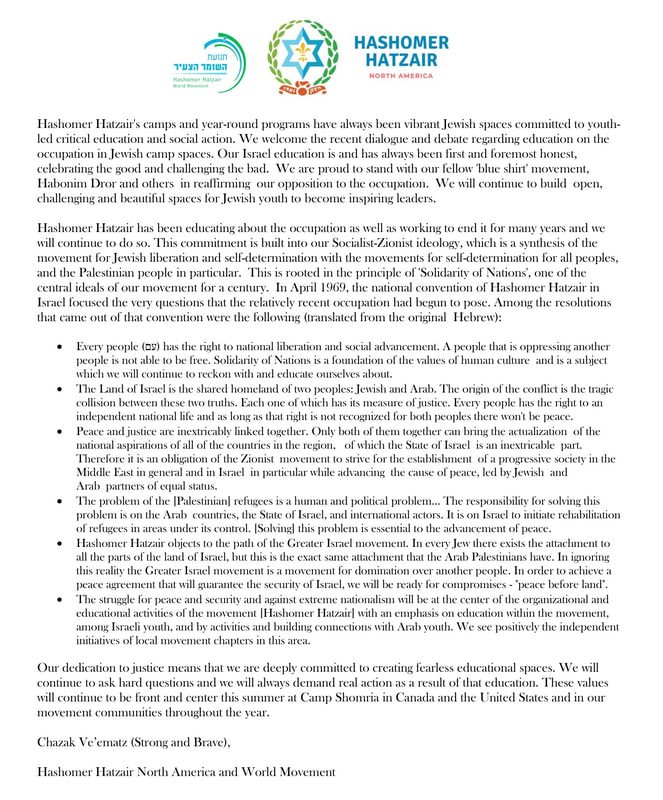|
Recently, there has been growing focus and debate on the role Jewish educational spaces ought to play in educating their communities about the 51 year old occupation. Last year when a West Coast Jewish camp displayed a Palestinian flag they wound up apologizing. When the executive director of Breaking the Silence spoke in Australia many in the community were up in arms. When a youth leader from the UK joined a Kaddish for Gaza major controversy unfolded. When the North American activist group, If Not Now ran training sessions for Jewish camp counselors, Jewish youth and camp organizations had to choose sides.
Soon after, Jewish organizations began releasing statements and earlier this summer the youth movement I grew up in and am involved in today, Hashomer Hatzair, published its own statement, adding our voices to the ongoing debate. This is that statement:
It's a statement that I took part in writing and it is a statement that I am proud of. The words in that document include excerpts from a statement written by Hashomer Hatzair members in Israel in 1969. Even then the violence of the occupation and the injustices of the Palestinian refugee crisis, a direct result of the Nakba twenty years earlier, were visible.
When I was thinking about what I thought that statement should represent the question of 'why?' kept creeping back. Why continue to work to build this movement? Why continue to carry the responsibility for this movement; its history, which includes both beautiful and terrible acts, as well as its future. The first part of the answer to that question is rooted in where I come from. I grew up in Hashomer Hatzair in Toronto and spent my summers at Camp Shomria, lived in a commune with others from the movement for years in Brooklyn, and I've been living in Israel for nearly seven years building and taking part in projects that reflect the core values of this movement. It is friendship and community, family and history. It is where I come from and for better and for worse I carry this identity with me. Hashomer Hatzair is world class in its critical education. The democratic and dialogical education we engage in, and the truly youth-led community that we create, has produced incredible educators, facilitators, thinkers and doers. We have, for over a century, built vibrant secular Jewish culture in our homes and communities. Our Jewish identity is rooted in the idea that we are a people, or "עם" in Hebrew. There is no perfect translation for that word, because it weaves together culture, religion, history, community, and ethnicity. Our secular Shabbat traditions, the text studies we engage in, and the Hebrew culture at the center of our communities are all examples of this unique secular Judaism that manifests as celebration, as literature, and as language. And we have a century of experimentation with socialist life, from the Kibbutz to the commune. Throughout, in every model we build, the values of human equality and economic justice remain at the center of our thought and action in the world as we build new models for new eras. The above are all reasons I feel connected to this movement, but most relevant to the statement we made on education about the occupation is that the relationships we build with Israel are honest, deep and unafraid to tackle the terrible and honor the beautiful. For example, members of our movement around the world learn about our history as, among other things, a bi-nationalist movement in the years before 1948 and we have begun to reckon with the Nakba, including our role in that history. Our movement continues to root its Socialist-Zionist ideology in the principle of Achvat Amim [solidarity of nations]. I see this principle as our movement's central mission today. Not to exclude the other elements of our movement, but to anchor them. As we move forward we need to stand in solidarity with other communities that are in danger and we need to ask them to be shoulder to shoulder with us as we counter the very real threat of antisemitic violence in all the communities we live in. We also need to renew our commitment to building a better future with Palestinians and Jews in the place both peoples call home. These conversations are sparking new dialogue about how we can actively be involved in building a future based on equality and self-determination for all peoples in the place they call home. This work is beginning in Hashomer Hatzair, and it is essential that the larger community begin similar processes. We all have to engage in the hard work of learning about the reality of the past and the present in our camps, schools, campuses, and synagogues so that we can begin the even harder work of dismantling the terrible, even as we celebrate the beautiful.
1 Comment
Robbie
9/9/2018 06:39:02 pm
Thank you Daniel. This really, really resonates.
Reply
Your comment will be posted after it is approved.
Leave a Reply. |
Archives
May 2022
|
© 2022 A. Daniel Roth
 This work is licensed under a Creative Commons Attribution-NonCommercial-NoDerivatives 4.0 International License. |


